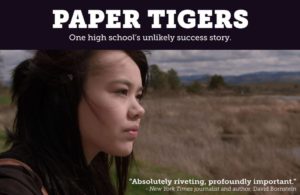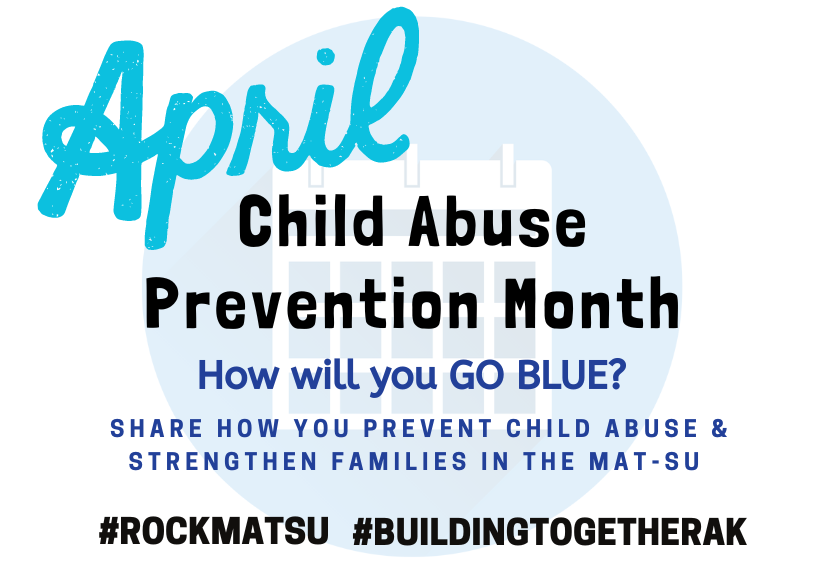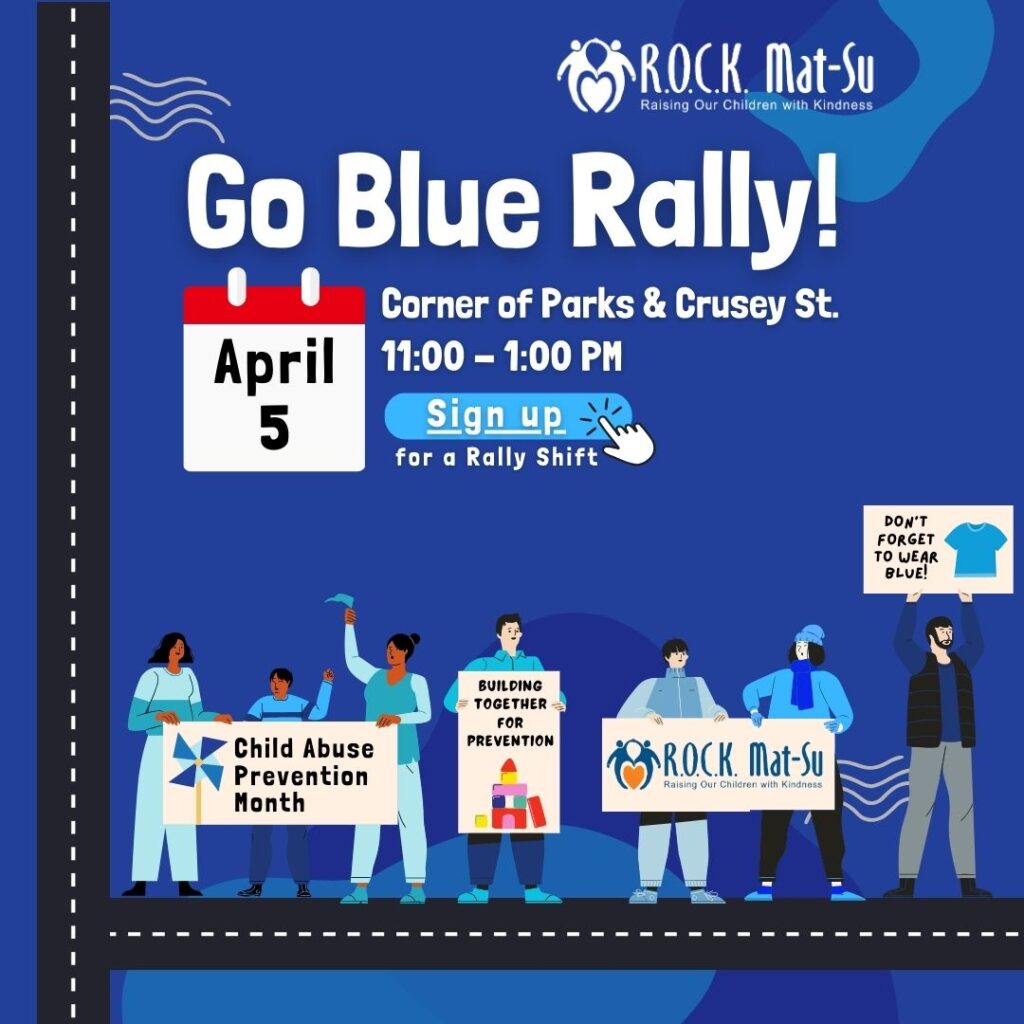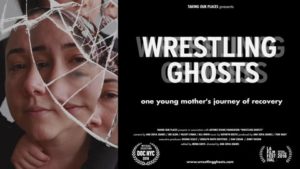Prevention Month Resources
April is National Child Abuse Prevention month, an effort to raise public awareness about and take a stand against child abuse and neglect. It is a time to acknowledge the importance of families and communities who work together to prevent child abuse and neglect, and to promote the social and emotional well-being of children and families through positive childhood experiences and resilience-building.
Go Blue Day Kick-Off! | April 5, 2024!
It’s almost time to kick off Child Abuse Prevention Month. This is a time for communities to rally together to build caring connections, supportive environments, and positive experiences for children and families.
Wear your best blue outfit and let’s rally together to raise awareness for Child Abuse Prevention Month at the Go Blue Rally!
Go Blue Kick Off Rally!
Add to Calendar
Friday, April 5, 2024
11:00 – 1:00 PM
Corner of E. Parks Hwy. & N. Crusey St., Wasilla
Ways to Celebrate Go Blue Day

Wear your best blue outfit and let’s rally together to raise awareness for Child Abuse Prevention Month at the Go Blue Rally! Sign-up for a rally shift today!
11:00 – 1:00 PM | Corner of E. Parks Hwy. & N. Crusey St., Wasilla

Sign-up to participate in the upcoming R.O.C.K. Mat-Su Book Club! Participants will decide when and where they would like to meet up. Space is limited, sign-up today!
Book Club | Parent Nation: Unlocking Every Child’s Potential, Fulfilling Society’s Promise

Let us know you are interested in becoming a trainer for the evidence-based child sexual abuse prevention curriculum called Stewards of Children. Contact Telsche Overby to express your interest in future train-the-trainer workshops.
Schedule and Host a Parent Café using the “SPA: Strong Parents Alaska” Toolkit. It has everything you need to host your own Parent Café. R.O.C.K. Mat-Su can help you advertise, let us know the details of your event.
SPA Toolkit: Download
SPA Guide & Appendix: Download

Pick up food coloring and simply add it to your next meal! Blue pancakes, milk, or ice cream to celebrate the big day! To make it extra-Alaskan, if you have frozen blueberries or blueberry jam to use that makes pancakes or ice cream deliciously blue as well.

Get decked out in all your blue- whether it’s a simple statement of a dashing blue tie or something snazzy like a blue feather boa, bring attention to it and let folks know why you #DareToBeTheOne to wear blue!

Ask a child in your life what they’d like to do with you for a half hour (or more!). Whatever it is- do it! Spending quality time with a child doing what they love makes them feel special and seen.

Pinwheels represent child abuse prevention. Use our template to design your own pinwheel or paint one on your window!

Head on over to R.O.C.K. Mat-Su’s Facebook page and share our Child Abuse Prevention Month posts and events!
I highly recommend checking out the Alaska Children’s Trust Facebook page and website as well!

Pinwheels represent child abuse prevention. Use our template to design your own pinwheel or paint one on your window!
Events
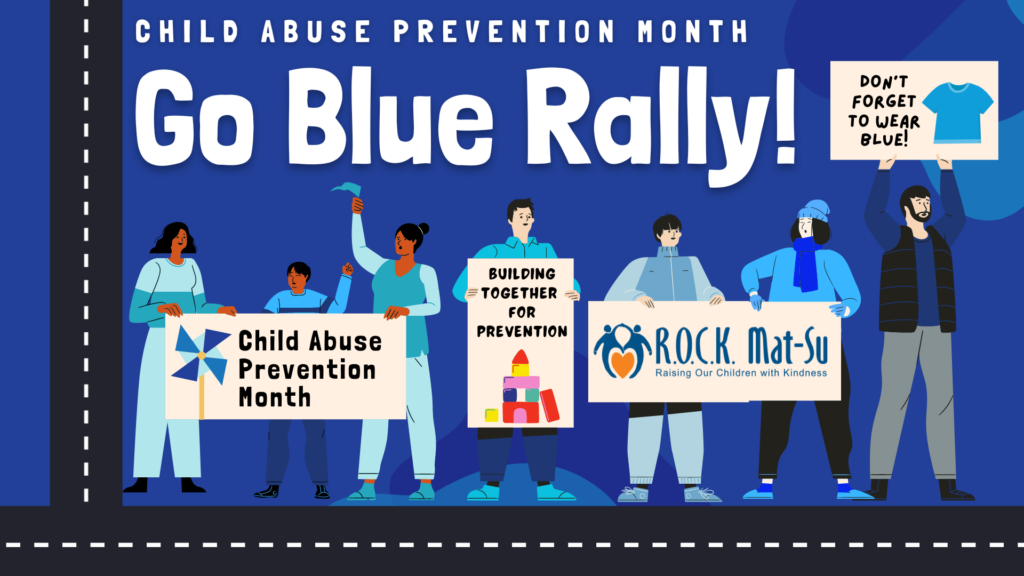
Kick-Off | Go Blue Rally
Dates: Fri., April 5, 2024
Times: 11:00 – 1:00 PM
Location: Corner of E. Parks Hwy & N.Crusey St., Wasilla
Event Details: Facebook | Connect Mat-Su
Event Contact: Colleen Andrews
Rally Shift Registration: Click Here
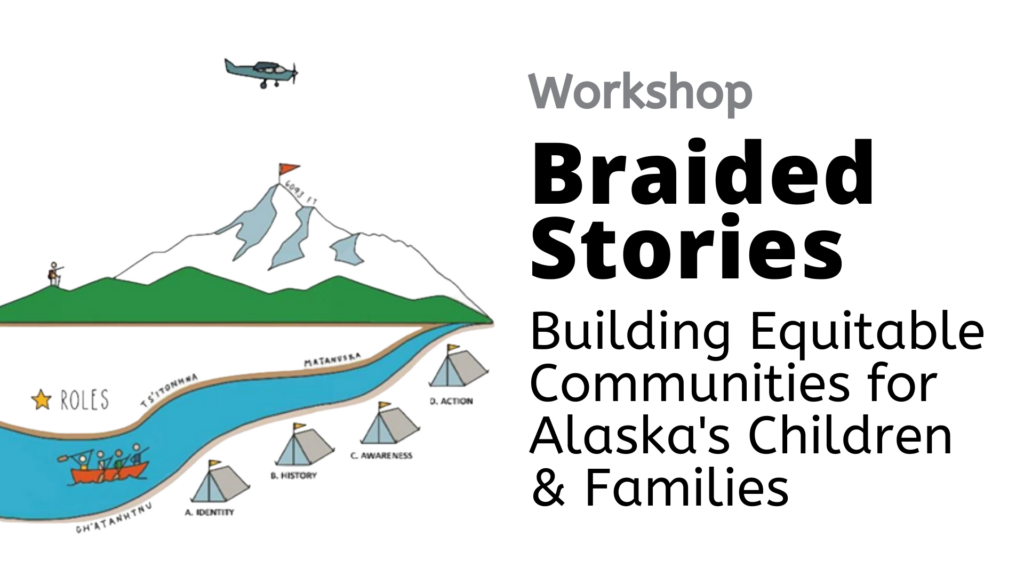
Workshop | Braided Stories
Building Equitable Communities for Alaska’s Children & Families
Dates: Tues April 16 & Weds April 17
Times: 8:30 – 4:30 PM
Location: Mat-Su Health Foundation
Learn More: Click Here
Registration: Click Here
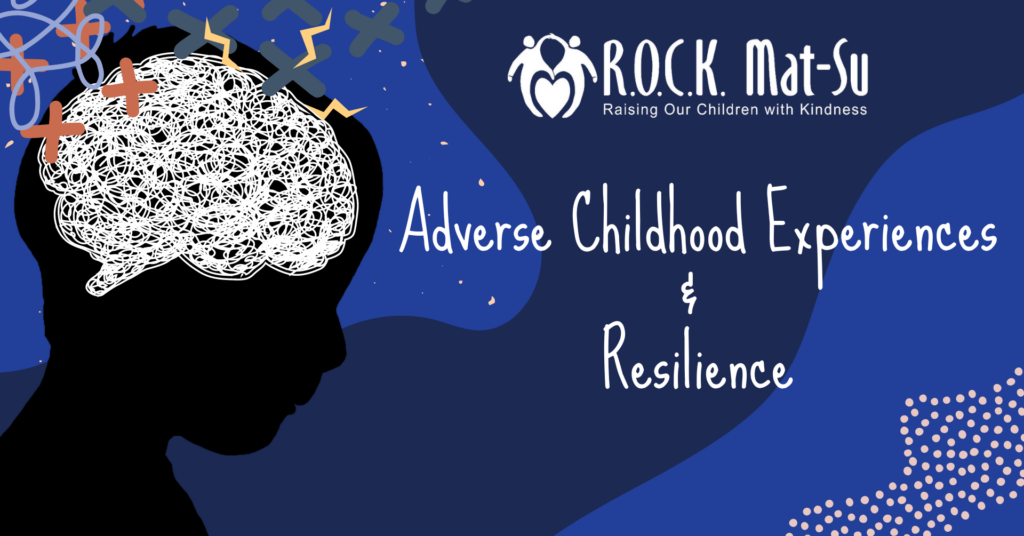
Training | ACEs & Resilience
Dates: Mon., April 8, 2024
Times: 1:00 – 2:30 PM
Location: Zoom or Mat-Su Health Foundation Conference Center
Event Details: Facebook | Connect Mat-Su
Content Contact: Michelle Boyden
Event Contact: Colleen Andrews
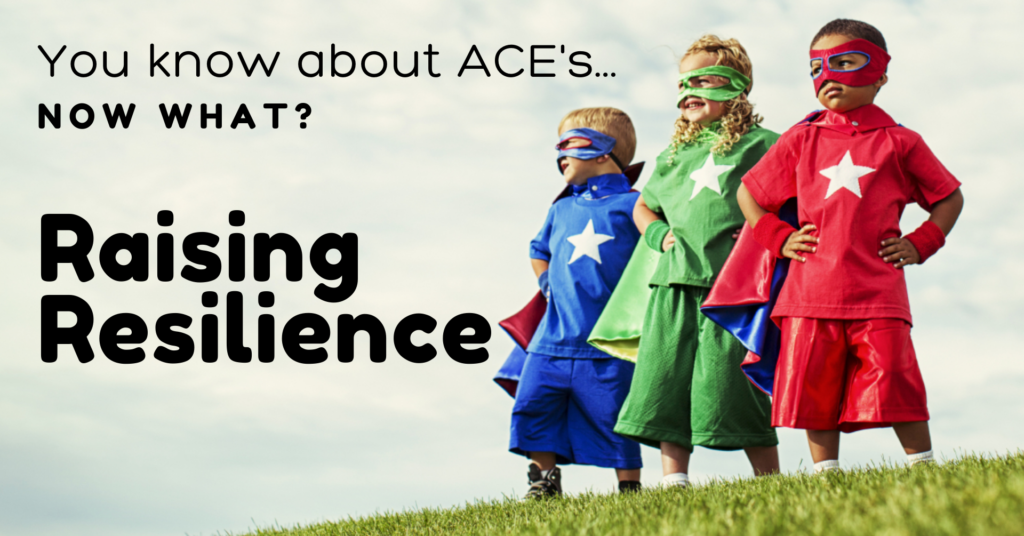
Training | Raising Resilience
Dates: Wed., April 10, 2024
Times: 10:00 – 11:00 AM
Location: Zoom or Mat-Su Health Foundation Conference Center
Event Details: Facebook | Connect Mat-Su
Content Contact: Michelle Boyden
Event Contact: Colleen Andrews
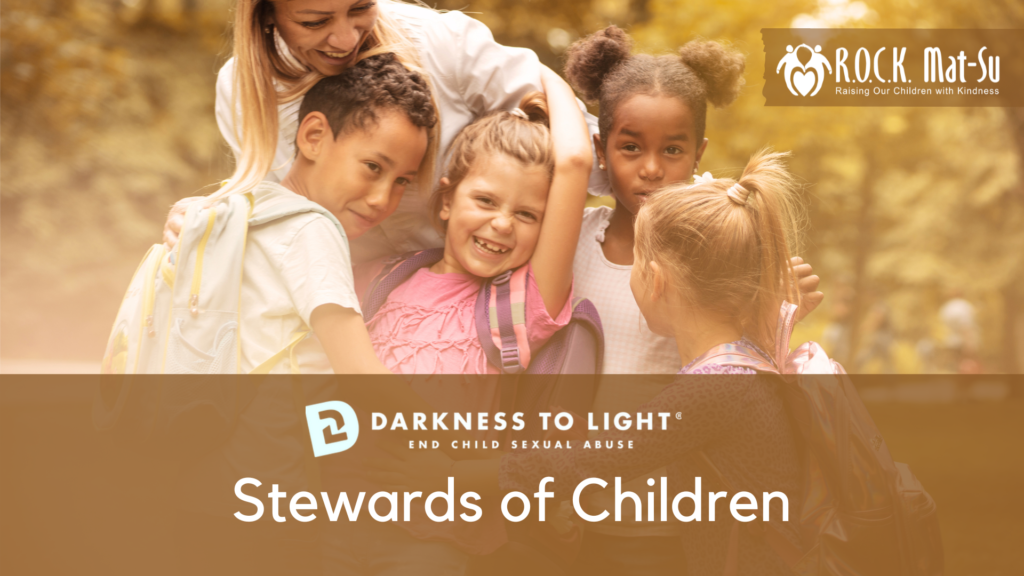
Training | Stewards of Children®
Date: Fri., April 5, 2024
Time: 10:00 AM – 12:00 PM
Location: Mat-Su Health Foundation Conference Center
Date: Mon., April 8, 2024
Time: 10:00 AM – 12:00 PM
Location: Mat-Su Health Foundation Conference Center
Event Details: Facebook | Connect Mat-Su
Content Contact: Telsche Overby
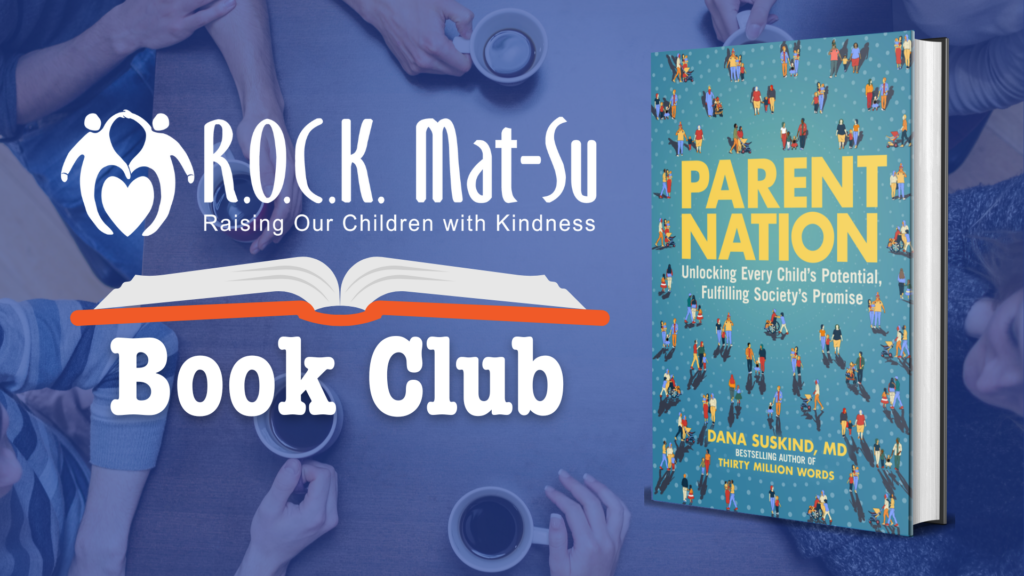
Book Club | Parent Nation
Unlocking Every Child’s Potential, Fulfilling Society’s Promise
Meet Up Details: TBD by participants feedback
Sign-Up: Click Here
Space is limited. Sign-up Today!
Recommendations: Books & Films
Available for individuals and groups at the R.O.C.K. Mat-Su Library!
R.O.C.K. Mat-Su hosts a small lending library through the library management app Libib. Click the button above and let us know you are interested in setting up an account.
R.O.C.K. Mat-Su’s collection focuses on topics associated with the collective’s vision to end child maltreatment and promote family resilience. Books and media focus on adverse childhood resilience, community organizing, healing from child sexual abuse, parenting, partnerships, racial equity, resilience, trauma, and trauma-sensitive education.
BOOKS
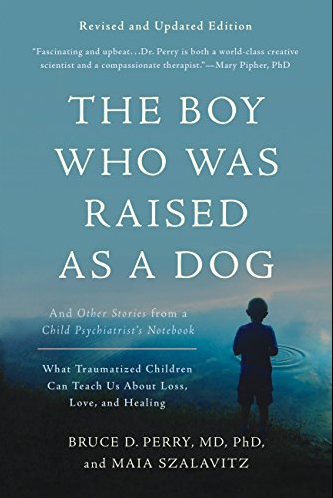
How does trauma affect a child’s mind – and how can that mind recover? In the classic The Boy Who Was Raised as a Dog, Dr. Perry explains what happens to the brains of children exposed to extreme stress and shares their lessons of courage, humanity, and hope. Only when we understand the science of the mind and the power of love and nurturing can we hope to heal the spirit of even the most wounded child.
Source: Reading Between the Wines
-
What does it mean to be empathetic to one another? Why is that important?
-
Is empathy something you turn on and off depending on who you are interacting with or in what context you are interacting?
-
Are doctors who often have to separate their emotions from the situation at hand (e.g. performing heart surgery on a child patient) exhibiting empathy? How does empathy play a role in the doctor-patient relationship?
-
How much of an effect will our increased reliance on the Internet / social media to connect with others also impact our children’s children’s biological development?
-
If psychiatrists or journalists watch or report on people suffering, should they intervene? (i.e. Kevin Carter and “Starving Child and Vulture”)
-
Where does the boundary lie between helping people resolve their issues versus taking care of them?
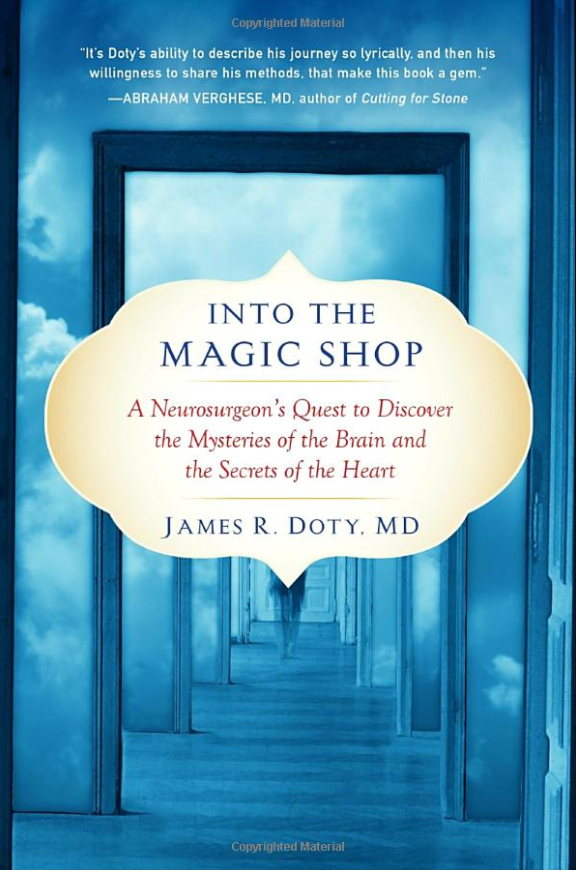
Growing up in the high desert of California, Jim Doty was poor, with an alcoholic father and a mother chronically depressed and paralyzed by a stroke. Today he is the director of the Center for Compassion and Altruism Research and Education (CCARE) at Stanford University, of which the Dalai Lama is a founding benefactor. But back then his life was at a dead end until at twelve he wandered into a magic shop looking for a plastic thumb. Instead he met Ruth, a woman who taught him a series of exercises to ease his own suffering and manifest his greatest desires. Her final mandate was that he keep his heart open and teach these techniques to others. She gave him his first glimpse of the unique relationship between the brain and the heart.
Doty would go on to put Ruth’s practices to work with extraordinary results—power and wealth that he could only imagine as a twelve-year-old, riding his orange Sting-Ray bike. But he neglects Ruth’s most important lesson, to keep his heart open, with disastrous results—until he has the opportunity to make a spectacular charitable contribution that will virtually ruin him. Part memoir, part science, part inspiration, and part practical instruction, Into the Magic Shop shows us how we can fundamentally change our lives by first changing our brains and our hearts.
Source: Super Summary
-
Discuss the figurative and literal significance of the work’s title. What is “the magic shop” to Doty?
-
Although Doty provides readers with instructions on how to relax the body, clear the mind, etc., the majority of the book takes the form of a memoir. Why might Doty have chosen this genre to communicate Ruth’s teachings?
-
How does Doty characterize his childhood in Lancaster? In what ways do his experiences there shape his life going forward?
-
What initially attracts Doty to medicine? How does his understanding of what it means to be a doctor change over the course of the book?
-
Discuss the different theories regarding near death experiences that Doty explores. Why does Doty ultimately reject the need to “explain” his own NDE in these terms?
-
What is neuroplasticity? In what ways does it explain the ability of techniques like visualization to effect real world change?
-
Choose one of the anecdotes involving Doty’s patients. How does it contribute to the overall meaning of the work?
-
Although Ruth is clearly a central figure in Doty’s life, he knows relatively little about her life and circumstances; as a boy, in fact, he sees her as an almost “supernatural being” (60).
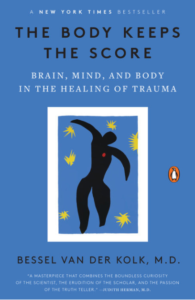
Trauma is a fact of life. Veterans and their families deal with the painful aftermath of combat; one in five Americans has been molested; one in four grew up with alcoholics; one in three couples have engaged in physical violence. Dr. Bessel van der Kolk, one of the world’s foremost experts on trauma, has spent over three decades working with survivors. In The Body Keeps the Score, he uses recent scientific advances to show how trauma literally reshapes both body and brain, compromising sufferers’ capacities for pleasure, engagement, self-control, and trust. He explores innovative treatments—from neurofeedback and meditation to sports, drama, and yoga—that offer new paths to recovery by activating the brain’s natural neuroplasticity. Based on Dr. van der Kolk’s own research and that of other leading specialists, The Body Keeps the Score exposes the tremendous power of our relationships both to hurt and to heal—and offers new hope for reclaiming lives.
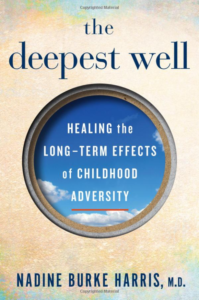
Dr. Nadine Burke Harris was already known as a crusading physician delivering targeted care to vulnerable children. But it was Diego—a boy who had stopped growing after a sexual assault—who galvanized her journey to uncover the connections between toxic stress and lifelong illnesses.
The stunning news of Burke Harris’s research is just how deeply our bodies can be imprinted by ACEs—adverse childhood experiences like abuse, neglect, parental addiction, mental illness, and divorce. Childhood adversity changes our biological systems, and lasts a lifetime. For anyone who has faced a difficult childhood, or who cares about the millions of children who do, the fascinating scientific insight and innovative, acclaimed health interventions in The Deepest Well represent vitally important hope for preventing lifelong illness for those we love and for generations to come?
Source: Lead to Healing
Chapter by chapter questions available at Lead to Healing.
FILMS
TRIGGER WARNING: This documentary discusses multiple forms of trauma, including intergenerational trauma, sexual assault, and mental health.
This film is not appropriated for children.
92 Minutes
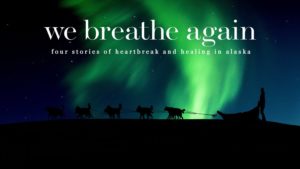
57 minutes
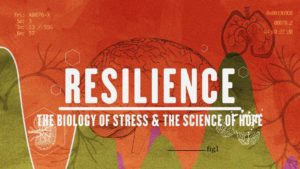
– Laura Porter, Co-Founder, ACE Interface
individuals who looked at the ACEs research and the emerging science of Toxic Stress and asked, Why are we waiting? Each took this new information and used it in new ways. Dr. Nadine Burke Harris, a pediatrician in San Francisco, intervenes early with her young patients who are at greater risk for diabetes and asthma as well as learning and behavior problems now. In New Haven, Connecticut, we meet Alice Forrester and Laura Lawrence of The Clifford Beers Clinic, which provides mental health services for children by including the entire family in their programs. In an elementary school across town, kindergarteners recite “Miss Kendra’s List”—a bill of rights for children—and learn ways of expressing and coping with their stress. In the great Northwest, communities across the state of Washington brought together teachers, police officers, social service workers, and government officials to learn about the brain science of adversity. Since implementing “trauma-informed” policies and practices, these communities have seen drastic reductions in rates of everything from dropping out of high school to teen pregnancy, and youth suicide domestic violence.
60 Minutes
